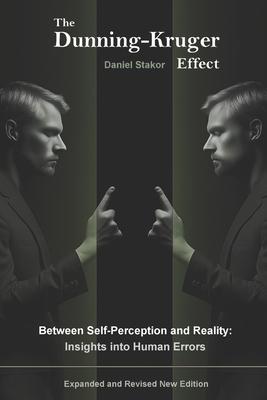
Book
The Dunning-Kruger Effect: Between Self-Perception and Reality
(Write a Review)
Paperback
$14.80
Discover the compelling dynamics of human psychology with "The Dunning-Kruger Effect: Between Self-Perception and Reality." This book delves deep into the intriguing phenomenon where individuals with limited knowledge overestimate their capabilities, while experts may underestimate their competence. Through thorough research and insightful analysis, this book sheds light on how this cognitive bias affects various aspects of our lives, from personal development to professional success. Starting with a comprehensive introduction to the Dunning-Kruger Effect, the book traces its origins, historical context, and the psychology behind overestimation. Readers will explore the foundational studies and the latest research findings that continue to reveal new dimensions of this fascinating topic. The book then navigates through the mechanisms of the Dunning-Kruger Effect, including cognitive biases and heuristics, the critical role of metacognition, and the importance of feedback. It also uncovers the neurobiological foundations that underpin this cognitive distortion, offering a holistic understanding of the effect. In practical terms, "The Dunning-Kruger Effect: Between Self-Perception and Reality" examines how this phenomenon manifests in education, workplaces, social media, and even healthcare. It provides a detailed exploration of how overestimation can impact learning outcomes, leadership effectiveness, public discourse, and professional practice. Measurement and identification of the Dunning-Kruger Effect are meticulously discussed, highlighting various research methods, the comparison between self-assessment and objective evaluation, and the challenges and limitations faced by researchers. Innovative new measurement techniques are also presented, paving the way for more accurate future studies. To address the Dunning-Kruger Effect, the book offers strategic approaches for individuals, educational institutions, and businesses. Practical tips and actionable measures are designed to help readers recognize and mitigate the impact of this cognitive bias in their own lives and organizations. Beyond the realm of psychology, the book explores the broader implications of the Dunning-Kruger Effect in economics, politics, art, and digital technology. It examines how this bias influences societal structures, decision-making processes, and cultural dynamics in the digital age. The book also engages with criticisms and controversies surrounding the Dunning-Kruger Effect. It addresses scientific debates, common misunderstandings and misuses of the concept, and provides critical perspectives on its limitations. Finally, the book looks at related concepts such as the Impostor Syndrome and the Reverse Dunning-Kruger Effect, connecting these to other cognitive biases and examining their long-term effects. Hypothetical scenarios in education, corporate management, public perception, and future trends offer readers a forward-looking perspective. Whether you are a student, educator, professional, or simply curious about the complexities of human cognition, "The Dunning-Kruger Effect: Between Self-Perception and Reality" is an essential read. It not only enhances your understanding of this psychological phenomenon but also equips you with the tools to foster self-awareness, continuous learning, and personal growth.
Discover the compelling dynamics of human psychology with "The Dunning-Kruger Effect: Between Self-Perception and Reality." This book delves deep into the intriguing phenomenon where individuals with limited knowledge overestimate their capabilities, while experts may underestimate their competence. Through thorough research and insightful analysis, this book sheds light on how this cognitive bias affects various aspects of our lives, from personal development to professional success. Starting with a comprehensive introduction to the Dunning-Kruger Effect, the book traces its origins, historical context, and the psychology behind overestimation. Readers will explore the foundational studies and the latest research findings that continue to reveal new dimensions of this fascinating topic. The book then navigates through the mechanisms of the Dunning-Kruger Effect, including cognitive biases and heuristics, the critical role of metacognition, and the importance of feedback. It also uncovers the neurobiological foundations that underpin this cognitive distortion, offering a holistic understanding of the effect. In practical terms, "The Dunning-Kruger Effect: Between Self-Perception and Reality" examines how this phenomenon manifests in education, workplaces, social media, and even healthcare. It provides a detailed exploration of how overestimation can impact learning outcomes, leadership effectiveness, public discourse, and professional practice. Measurement and identification of the Dunning-Kruger Effect are meticulously discussed, highlighting various research methods, the comparison between self-assessment and objective evaluation, and the challenges and limitations faced by researchers. Innovative new measurement techniques are also presented, paving the way for more accurate future studies. To address the Dunning-Kruger Effect, the book offers strategic approaches for individuals, educational institutions, and businesses. Practical tips and actionable measures are designed to help readers recognize and mitigate the impact of this cognitive bias in their own lives and organizations. Beyond the realm of psychology, the book explores the broader implications of the Dunning-Kruger Effect in economics, politics, art, and digital technology. It examines how this bias influences societal structures, decision-making processes, and cultural dynamics in the digital age. The book also engages with criticisms and controversies surrounding the Dunning-Kruger Effect. It addresses scientific debates, common misunderstandings and misuses of the concept, and provides critical perspectives on its limitations. Finally, the book looks at related concepts such as the Impostor Syndrome and the Reverse Dunning-Kruger Effect, connecting these to other cognitive biases and examining their long-term effects. Hypothetical scenarios in education, corporate management, public perception, and future trends offer readers a forward-looking perspective. Whether you are a student, educator, professional, or simply curious about the complexities of human cognition, "The Dunning-Kruger Effect: Between Self-Perception and Reality" is an essential read. It not only enhances your understanding of this psychological phenomenon but also equips you with the tools to foster self-awareness, continuous learning, and personal growth.
Paperback
$14.80